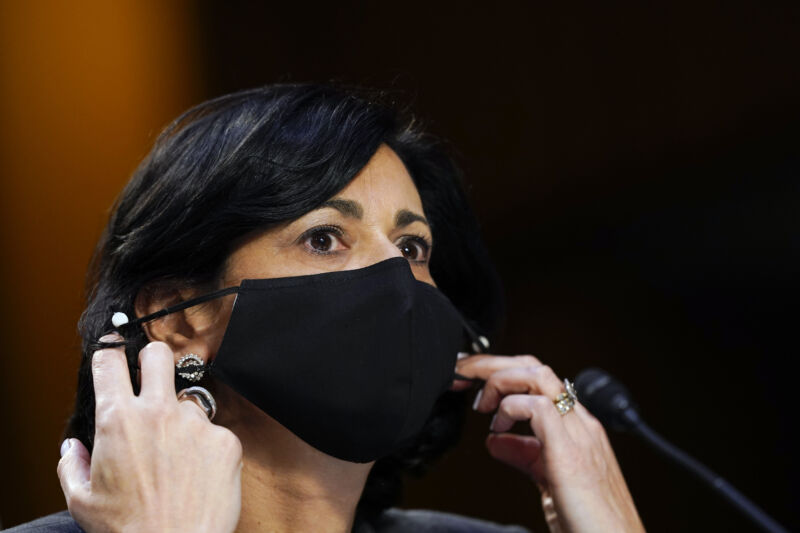
Highly effective COVID-19 vaccines are simply too slow to stop surges like the one underway in Michigan, Rochelle Walensky, director of the Centers for Disease Control and Prevention, said Monday.
Dr. Walensky’s explanation during the White House COVID-19 press briefing comes amid mounting requests and calls for federal authorities to flood Michigan with vaccine supply. The state has seen a 400 percent spike in cases since March 5, when state officials eased restrictions on residential gatherings and occupancy limits for bars, restaurants, venues, and stores. Since then, the highly transmissible B.1.1.7 coronavirus variant has also increased in prevalence. Now, the state’s seven-day average for new daily cases is over 7,377, and hospitals are filling up.
On March 30, when the surge was already in full swing, Michigan Gov. Gretchen Whitmer appealed to the White House for additional vaccine shipments. However, the White House declined, opting to stick to its largely population-based strategy for dolling out vaccine supply to each state and jurisdiction.
Experts quickly decried the move, saying that an increase in vaccine doses could help bring an end to the surge in cases. In an interview on CBS’s Face The Nation Sunday April 11, former Food and Drug Administration commissioner and Pfizer board member Dr. Scott Gottlieb echoed his calls for the White House to boost Michigan’s vaccine allotment. “It’s a request that’s been made for weeks now, and I think we should have done it weeks ago,” he said. “We need to get in the habit of trying to surge resources into those hotspots to put out those fires of spread.”
But Walensky pushed back on that idea Monday, noting that it takes weeks for people to build up protective immune responses from vaccines. With the mRNA vaccines made by Pfizer-BioNTech and Moderna—the two most common vaccines used in the US right now—people don’t reach full protection until two weeks after their second dose, which occurs three and four weeks after their first, respectively.
Reality check
“We know that if vaccines go in arms today, we will not see an effect of those vaccines, depending on the vaccine, for somewhere between two to six weeks,” Walensky said. She continued:
So when you have an acute situation, [an] extraordinary number of cases like we have in Michigan, the answer is not necessarily to give vaccine. In fact, we know that the vaccine will have a delayed response. The answer to that is to really close things down, to go back to our basics, to go back to where we were last spring, last summer and to shut things down, to flatten the curve.
Walensky emphasized the use of lockdowns, social distancing measures, testing, and contact tracing as the primary responses to surges like Michigan’s. As before, she noted that the CDC has surged other resources to Michigan, including teams to help deal with specific outbreaks and hasten the use of the vaccine doses already distributed to the state.
Meanwhile, the B.1.1.7 variant is continuing to spread in states across the country, Andy Slavitt, a senior White House adviser on the pandemic, said during the press briefing. It is now the predominant lineage of the virus nationwide. The White House doesn’t want to prioritize Michigan, potentially compromising vaccination campaigns in others states, Slavitt explained. The current strategy provides the “ability to vaccinate people quickly in each of those states,” Slavitt said, “rather than taking vaccines and shifting it to play whack-a-mole, [which] isn’t the strategy that public health leaders and scientists have laid out.”
The points were largely echoed in a press briefing by the World Health Organization on Monday, which emphasized that globally, the pandemic is growing exponentially. There have now been seven consecutive weeks with increases in cases and four weeks of increasing deaths. Several concerning variants are driving outbreaks in various regions. “This is not the situation we want to be in 16 months into a pandemic, where we have proven control measures,” WHO technical lead Maria Van Kerkhove said in the briefing.
Vaccinations are underway, she noted, but their full impact is not yet in effect. For now, she and the WHO director-general echoed Walensky, imploring people to get back to the basics of physical distancing, mask-wearing, ventilation, hand hygiene, and avoiding crowds—until vaccination efforts are farther along.
“We need headlines around the tools that we have right now that can prevent infections and save lives,” Van Kerkhove said. “We are in a critical point... It is time right now where everyone has to take stock and have a reality check about what we need to be doing.”
"save" - Google News
April 13, 2021 at 03:01AM
https://ift.tt/2OHZOJ7
It’s too late for vaccines to save Michigan, CDC director explains - Ars Technica
"save" - Google News
https://ift.tt/2SvBSrf
https://ift.tt/2zJxCxA
Bagikan Berita Ini














0 Response to "It’s too late for vaccines to save Michigan, CDC director explains - Ars Technica"
Post a Comment